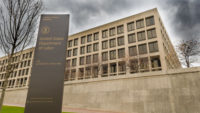The U.S. Dept. of Labor is slowing its move to potentially revoke Arizona’s occupational health and safety plan after state officials say they’ve moved to address federal officials’ concerns.
The department’s Occupational Safety and Health Administration (OSHA) is reopening the comment period on a proposed rule to reconsider and revoke its approval of the Arizona State Plan for Occupational Safety and Health, according to a notice published in the Federal Register Aug. 15. OSHA is also rescheduling a public hearing on the proposal that had been set for Aug. 16.
Arizona is one of 21 states with its own safety plan covering private sector and government workers under the Occupational Safety and Health Act, which is permitted with OSHA approval as long as the programs are at least as effective as federal requirements. The state program is administered by the Arizona Division of Occupational Safety and Health (ADOSH), which is part of the Industrial Commission of Arizona (ICA). In April, OSHA began moving to revoke Arizona’s plan, citing its increasing concerns that “the state is either unable or unwilling to maintain its commitment to provide a program for worker safety and health protection as the OSH Act requires.” At the time, OSHA opened a public comment period for its proposal.
The day before the original comment period ended, the ICA and ADOSH submitted a 51-page comment from attorney Melanie Paul, the co-leader of national employment law firm Jackson Lewis’ workplace safety and health group. In it, the agencies objected to OSHA’s proposal and outlined measures the state had taken to address OSHA’s concerns.
“The ICA believes that more effective communication and collaboration between the ICA and OSHA can resolve concerns that OSHA might have about the operation of Arizona’s State Plan. Arizona remains willing to communicate and collaborate with OSHA and requests that OSHA take needed steps to reciprocate,” Paul wrote on behalf of the state agencies.
ICA and ADOSH moved to adopt rules on beryllium in construction and shipyards, cranes and derricks in construction as well as railroad roadway work, and took other action sought by OSHA, according to the letter. The agencies also updated their documentation provided to OSHA to show it had already made some of the moves sought by OSHA, such as adopting rules on trenching and excavation.
State officials also argued that concerns over Arizona’s fall protection rule had been fully resolved in 2015, when OSHA officials concluded in an annual monitoring evaluation that Arizona’s fall protection rules were at least as effective as federal requirements.
Arizona lawmakers passed a bill, HB2120, on June 23 that ties statutory ADOSH penalties to corresponding OSHA penalties. The legislation also authorizes adoption of an emergency temporary standard when ICA or OSHA deems that “grave danger criteria” have been met. Arizona Gov. Doug Ducey signed the bill into law July 6, the day after OSHA’s original comment period closed.
Paul’s letter questioned if OSHA’s primary source of discontent was in 2021 when Arizona failed to adopt the COVID-19 healthcare sector emergency temporary standard with requirements around unvaccinated workers. OSHA had threatened to revoke state safety plans from Arizona, Utah and South Carolina for not adopting their own versions of the emergency temporary standard.
“OSHA has characterized the issues it has with Arizona’s State Plan as a ‘history of shortcomings,’ but much of what OSHA included in the Federal Register notice is pretext for revocation—an action that would undoubtedly result in increased injuries and fatalities in Arizona’s workforce,” she wrote.
Industry Response
OSHA’s proposed rule received a mixed response during the original public comment period. Fred Yamashita, executive director of AFL-CIO, and Rebecca Reindel, the union’s safety and health director, commented in favor of the proposal because, they wrote, the state safety plan “has a history and pattern of neglect to its workers.”
Joshua Umar, executive director of the American Subcontractors Association of Arizona, commented in opposition to the proposal, praising ADOSH’s dealings with subcontractors and its safety initiatives, writing that ADOSH Director Jessie Atencio “has been a mainstay of our [safety] programming efforts for many years.”
OSHA’s reopened comment period will last for 60 days. Anyone interested can comment via regulations.gov.




